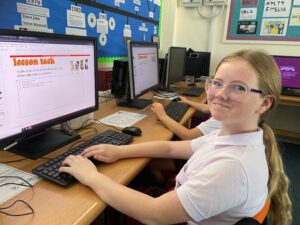
KS3
At Key Stage 3, the Computer Science curriculum focuses on three main strands identified by the Royal Society as integral to developing computing, with each component is essential in preparing pupils to thrive in an increasingly digital world. The curriculum weaves together digital literacy, information technology and computer science across the Key Stage, and ensures continual progression from year to year.
Students will learn computational thinking techniques for tackling real-world problems while developing an understanding of algorithms and logical reasoning for effective problem-solving.
Proficiency in programming starts in Year 7 with Scratch and Edublocks and moves quickly through to textural programming with Python.
The curriculum covers foundational concepts such as Boolean logic, binary representation, and basic binary operations. Students will gain comprehensive knowledge of computer systems, including hardware, software components, data manipulation, and execution of instructions.
Engaging in creative projects using multiple applications and platforms, students will learn to collect, analyse and model data, as well as create digital artefacts with attention to trustworthiness, design, and usability. Promoting responsible technology use, students will develop literacy in recognising and reporting inappropriate content and recognise the importance of critically assessing the information they see online.
With an eye to the future, units covering cyber-security, artificial intelligence, and app/game development are reviewed and updated regularly. The curriculum will ensure a well-rounded and forward-looking student experience in preparation for Key Stage 4 and beyond.
GCSE Computer Science (EDEXCEL 1CP2)
In response to the rapid evolution of computer technology, the widespread use of mobile devices, and the surge in web-related technologies, the GCSE Computer Science curriculum is designed to equip students with essential skills for the digital era. Recognising the growing demand for technologically proficient individuals in contemporary businesses, there is a strong emphasis on programming, logical thinking and problem solving.
Key Subject Content:
Computational Thinking
Data
Computers
Networks
Issues and Impact
Programming
The GCSE Computer Science program not only serves as a foundation for further study at the A Level but also opens pathways to diverse university courses such as systems engineering, software engineering, cyber security, and artificial intelligence.
The relevance of computing skills extends beyond traditional IT roles, reaching into various professions. This subject not only supports advancement in Science, Technology, Engineering, and Mathematics (STEM) fields but also fosters transferable skills, notably problem-solving and logical thinking.
AS/A Level (OCR H046, H446)
The A Level Computer Science curriculum is designed to be relevant to the modern and changing world of computing. The curriculum values computational thinking, helping learners to develop the skills to solve problems, design systems and understand the power and limits of human and machine intelligence.
Aims and learning outcomes:
The aims of this qualification are to enable learners to develop:
• an understanding of and ability to apply the fundamental principles and concepts of computer science including; abstraction, decomposition, logic, algorithms and data representation
• the ability to analyse problems in computational terms through practical experience of solving such problems, including writing programs to do so.
• the capacity for thinking creatively, innovatively, analytically, logically and critically
• the capacity to see relationships between different aspects of computer science
• the ability to articulate the individual (moral), social (ethical), legal and cultural opportunities and risks of digital technology